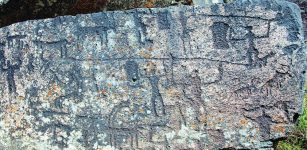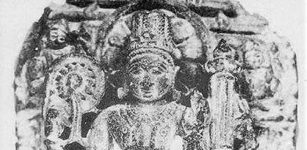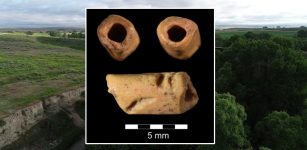Forgotten Ancient Kingdom Of Tuwana Is Hidden Among Ruins In Cappadocia
A. Sutherland - AncientPages.com - The familiar saying that the conquerors write history applies well to the forgotten ancient kingdom of Tuwana that was more or less erased from history. It was once a prosperous kingdom of great importance, but its history is lost in time today.
 The Hittities. The kingdom of Tuwana arose in the wake of the Hittite empire’s fall. Image credit: www.smithsonianchannel.com
The Hittities. The kingdom of Tuwana arose in the wake of the Hittite empire’s fall. Image credit: www.smithsonianchannel.com
It is still possible for Tuwana to gain proper historical recognition now that the ruins of this ancient and powerful kingdom were discovered in Cappadocia, Turkey.
How Tuwana Became A Rich And Powerful Kingdom
During the ninth and eighth centuries BC, the kingdom of Tuwana rose to prominence under a series of kings. Unfortunately, only a few of them are known from inscriptions.
Tuwana derives its name from the Late Bronze Age Tuwanuwa, one of the cities of the Hittite Lower Land. Tuwana was the largest and most important kingdom of the southern Tabal region of Anatolia. Tabal was a Luwian-speaking neo-Hittite 'state' that emerged from the Hittite empire's collapse.
The kingdom of Tuwana arose after the Hittite empire's fall. It became one of the city-states that helped fill the power vacuum in Turkey.
 Ruins in Cappadocia. Image credit: travelpromotionsturkey.com
Ruins in Cappadocia. Image credit: travelpromotionsturkey.com
Tuwana gained a strong position between the Phrygian and Assyrian empires. Tuwana facilitated trade throughout Anatolia and, as a direct result, the kingdom of Tuwana. As a result, it accumulated significant wealth. It was a wealthy kingdom with a strong economy and used a hieroglyphic language called Luwian. Later, the people of Tuwana adopted the alphabetical Phoenician script.
Tuwana lost its importance and greatness when the Assyrian Empire expanded westward and took control of all city-states.
Uncovering The Kingdom Of Tuwana In Cappadocia
The kingdom of Tuwana was practically unheard of and forgotten for a long time. Then, in 2012, archaeologists excavating a considerable site in southern Cappadocia, Turkey, uncovered the ruins of Tuwana.
Researchers from the University of Pavia and NY, who studied the site of ancient Tuwana, consider it part of the forgotten kingdom of Tuwana". Tiwana was only known from hieroglyphics and several sources from the Assyrian Empire, but the site was investigated archaeologically for the first time.
 Inscription in hieroglyphic Luwian script. ron Age II, 8th century BC, basalt - Oriental Institute Museum, University of Chicago.
Inscription in hieroglyphic Luwian script. ron Age II, 8th century BC, basalt - Oriental Institute Museum, University of Chicago.
Tuwana was one of the significant sites in terms of size in pre-classical Anatolia. The discovery of a massive city believed to be the base of Tuwana's power is changing the region's history.
With such a large and well-preserved find, archaeologists can finally piece together the story of this powerful and wealthy kingdom, which controlled trade through the Cilician Gates for several centuries.
In the second half of the 8th century BC, the king in Tuwana was Warpalawas II, son of Muwaharani I. These were times of strong influence from the kingdom of Mushki, ruled by King Mita (also identified as Midas of Phrygia).
Phrygia's power is seen in two Old Phrygian inscriptions found in Kemrhisar and by bronze objects of clear Phrygian origin in a tumulus at Kaynarca, seven kilometers northeast of Tyana.
Later, when the Phrygian kingdom and the kingdom of Urartu to the east fell to the Cimmerians, the kingdom of Tuwana disappeared.
Written by – A. Sutherland AncientPages.com Staff Writer
Updated on January 16, 2024
Copyright © AncientPages.com All rights reserved. This material may not be published, broadcast, rewritten or redistributed in whole or part without the express written permission of AncientPages.com
Expand for referencesMore From Ancient Pages
-
 Huge 2,000-Year-Old Roman Basilica Discovered In Israel May Have Been Built By Herod The Great
Archaeology | Jul 29, 2021
Huge 2,000-Year-Old Roman Basilica Discovered In Israel May Have Been Built By Herod The Great
Archaeology | Jul 29, 2021 -
 Two Scribes Penned 8th Century ‘Samaria Ostraca’ Inscriptions Unearthed In Samaria
Archaeology | Jan 23, 2020
Two Scribes Penned 8th Century ‘Samaria Ostraca’ Inscriptions Unearthed In Samaria
Archaeology | Jan 23, 2020 -
 Rare Stone Showing Ancient Rome’s City Limits – Accidentally Found
Archaeology | Jul 18, 2021
Rare Stone Showing Ancient Rome’s City Limits – Accidentally Found
Archaeology | Jul 18, 2021 -
 Unorthodox Ancient ‘Out-Of-This World’ Carvings Were Found And Destroyed – Mysterious Labyrinth And Unknown Ruins – Part 2
Featured Stories | Aug 13, 2020
Unorthodox Ancient ‘Out-Of-This World’ Carvings Were Found And Destroyed – Mysterious Labyrinth And Unknown Ruins – Part 2
Featured Stories | Aug 13, 2020 -
 Baku’s Mysterious Maiden Tower – Legend Of The Daughter Of Fire Who Saved The Sacred Temple May Be True
Featured Stories | Jul 5, 2021
Baku’s Mysterious Maiden Tower – Legend Of The Daughter Of Fire Who Saved The Sacred Temple May Be True
Featured Stories | Jul 5, 2021 -
 The First Australians Ate Giant Eggs Of Huge Flightless Birds That Went Excinct Over 47,000 Years Ago
Archaeology | May 25, 2022
The First Australians Ate Giant Eggs Of Huge Flightless Birds That Went Excinct Over 47,000 Years Ago
Archaeology | May 25, 2022 -
 The First ‘Viking’ Was A Bronze Age Man
Civilizations | Nov 18, 2019
The First ‘Viking’ Was A Bronze Age Man
Civilizations | Nov 18, 2019 -
 Ancient King Who Built A Mysterious Underground City Illuminated By Artificial Lights As Hiding Place
Featured Stories | Apr 16, 2018
Ancient King Who Built A Mysterious Underground City Illuminated By Artificial Lights As Hiding Place
Featured Stories | Apr 16, 2018 -
 Charlemagne – Most Famous Emperor Of Education And Enemy Of Pagan Worshippers – What Did He Really Mean For Europe?
Featured Stories | Mar 22, 2023
Charlemagne – Most Famous Emperor Of Education And Enemy Of Pagan Worshippers – What Did He Really Mean For Europe?
Featured Stories | Mar 22, 2023 -
 15 Prehistoric Rock Paintings Discovered Near Ancient Armenian City Of Ani
Archaeology | Dec 14, 2015
15 Prehistoric Rock Paintings Discovered Near Ancient Armenian City Of Ani
Archaeology | Dec 14, 2015 -
 Binary Code Was Used In Ancient India And Polynesia Long Before Leibnitz Invented It
Ancient Technology | Sep 28, 2017
Binary Code Was Used In Ancient India And Polynesia Long Before Leibnitz Invented It
Ancient Technology | Sep 28, 2017 -
 Dwarka – Pre-Harappan City That Could Rewrite The History Of The World
Civilizations | Aug 19, 2014
Dwarka – Pre-Harappan City That Could Rewrite The History Of The World
Civilizations | Aug 19, 2014 -
 Perfectly Preserved 10,500-Year-Old Basket Found In Muraba’at Cave
Archaeology | Mar 18, 2021
Perfectly Preserved 10,500-Year-Old Basket Found In Muraba’at Cave
Archaeology | Mar 18, 2021 -
 Enigma Of Mount Ararat – Researchers Are Determined To Reveal The Truth To The World
Featured Stories | Jun 27, 2014
Enigma Of Mount Ararat – Researchers Are Determined To Reveal The Truth To The World
Featured Stories | Jun 27, 2014 -
 Lost Viking Village Borgund And Its 45,000 Artifacts Hidden In A Basement Examined By Experts
Archaeology | Apr 22, 2022
Lost Viking Village Borgund And Its 45,000 Artifacts Hidden In A Basement Examined By Experts
Archaeology | Apr 22, 2022 -
 Unique And Priceless Large Roman Sculptures Found At Carlisle Cricket Club
Archaeology | May 25, 2023
Unique And Priceless Large Roman Sculptures Found At Carlisle Cricket Club
Archaeology | May 25, 2023 -
 Peace Of Callias – A Treaty That Ended The Greco-Persian Wars
Ancient History Facts | May 15, 2019
Peace Of Callias – A Treaty That Ended The Greco-Persian Wars
Ancient History Facts | May 15, 2019 -
 Latin America’s Oldest Beer Resurrected From 400-Year-Old Yeast
Archaeology | Aug 4, 2022
Latin America’s Oldest Beer Resurrected From 400-Year-Old Yeast
Archaeology | Aug 4, 2022 -
 Oldest Bead In America Discovered At La Prele Mammoth Site, Wyoming
Archaeology | Feb 13, 2024
Oldest Bead In America Discovered At La Prele Mammoth Site, Wyoming
Archaeology | Feb 13, 2024 -
 ‘Something’ Ancient And Strange Was Found Hidden Inside A Huge Underground Structure – What Happened Next Is A Mystery
Featured Stories | Nov 8, 2023
‘Something’ Ancient And Strange Was Found Hidden Inside A Huge Underground Structure – What Happened Next Is A Mystery
Featured Stories | Nov 8, 2023
